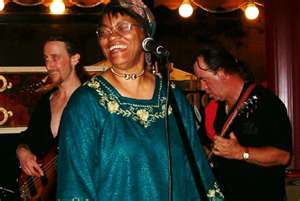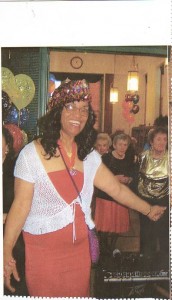 Shirley Lewis recently turned 74 and her singing career is still going strong. She is still the regal queen of the blues. Raised in a musical family, she has been singing since she was four. She feels that the biggest misconception of her talent is that everyone now only knows her as a blues singer.
Shirley Lewis recently turned 74 and her singing career is still going strong. She is still the regal queen of the blues. Raised in a musical family, she has been singing since she was four. She feels that the biggest misconception of her talent is that everyone now only knows her as a blues singer.
“I’m not a blues singer. I’m a singer. I’m a singer that sings blues,” she said. “I believe that music comes from the heart, not from the head. I believe that everything you sing, whether it’s rhythm and blues, blues, jazz, funk, punk, whatever you call it, all that stuff. If it doesn’t come from the heart, it isn’t enjoyable to me.”
The other misconception is that Lewis stems solely from African-American heritage. She is actually part Native American, African-American, and white. She sees herself as a Hopi and a Blackfoot. “I’m mostly American Indian.,” she said.
The singer has been around the world and he has been around the greater-Boston scene. These days, Lewis performs at Smoken’ Joe’s BBQ in Brighton and she’s a 22 year veteran of a music program in Cape Cod. She also travels to New York City, Philadelphia, Chicago, and Indianapolis.
“I’m all over the place,” she said. “I still travel, not as much as I used to, but I still tour.”
Unlike others who are on the scene for years, Lewis still sees a strong turnout wherever she sings. “It’s a humbling experience,” she said. “Where I go, I usually have a full house. It’s been part of my life for a long time. When you always have a good turn out, it makes you feel you’re loved. That’s the word, the word would be loved.”
Lewis, despite being in her seventies, has been known to move around a lot on stage, like a much younger woman. Yet, the singer cannot understand why anyone would expect her to stand still on stage. “People who stand there, what are they standing there for? Are you enjoying yourself or are you just standing there like a zombie?” She giggled.
Lewis stays in shape by walking and dancing. She is a dancer and an actress. “Movement is especially good on stage. It makes people in the audience move with you. When you stand still, it’s very boring. Just like if a person is singing monotone, it’s very boring. I don’t mean they can’t sing or they’re not good. To me, I like to see action. I’m an entertainer. If I go to a show, I want somebody to entertain me. That’s what I’m talking about. My movement is entertainment.”
When asked about people saying she moves like a young woman, the singer said “it’s not the age. It’s you’re feeling. I think you can be old and active. When you get old, you don’t have to become inactive. Some of these people who walk on canes, they dance with their canes. I think we have more problem with age in America then we do any place else.”
Lewis got her start in show business when somebody in a band had heard her sing in church. She was recruited by a band who were hired to open for B.B. King. “I went over and auditioned and I got it and I’ve been singing and traveling ever since.”
Memories that stand out most among her many include working with young people in the business. Touring and headlining are also among her longest lasting memories. She headlined in front of 80,000 people in 1997 at the Bessie Smith Strut Festival, in Chattanooga, Tennessee.
“It was like a sea of people. I never seen anything like it,” Lewis said. “It was an amazing thing. That’s something you’ll never forget, right? It was unbelievable.”
Another satisfying memory is seeing patrons lined up outside an establishment all the way down the block, which has happened quite a few times over the years. “The other things are OK,” she said. “You meet people. You sing with them. You perform with them. But that’s not as important as it is when you see the feelings of the peoples in the audience, how they respond to you.”
Through it all, Lewis has kept herself together. “I’m very humble,” she said “I’ve been there, done that. I’ve enjoyed it. I’ve had a good time. But I kept my sanity. I’ve never drank. I don’t drink. I don’t smoke. I don’t do drugs. I’ve never been in trouble in my life. Those are pretty good statements to say, right there.”
Lewis worked with people like Smokey Robinson who eventually went to Motown and became big stars. Though Lewis never became a household word, she is satisfied with how her career turned out. “I became the kind of star I wanted to be. I lead my life the way I wanted to lead. I worked through agents that booked me in the same rooms that they were booked in, and I got the same kind of money. But I didn’t go into the recording industry. I stayed away from it. I recorded some stuff back in the 60s, of course. Everybody did back them, with 45s.”
Lewis didn’t want to sign her life away to a record company. She had a good agent who kept her booked in the right places so she could make good money while raising two girls.
Lewis is a professional actress who has worked as an extra in movies and as a main character in live theaters. “Little Foxes” and “On Richard’s Mountain” are a few of the productions she was featured in. Most of her work was on the Canadian west coast. She has also worked in Kansas City and Mexico. During this time, Lewis kept busy off stage raising her two daughters.
Lewis has worked in so many different genres she eventually learned thousands of songs. Audiences never know what she’s going to sing, or wear, or do. When asked if she has ever had to struggle in show business, she was blunt.
“I struggled, but you don’t talk about those things,” she said. “Struggling is if you let yourself stop. You don’t give up even if you’re struggling. That’s my philosophy. I think that everyone in life has struggles. If you don’t, you don’t have a life. You’ve got to struggle in life, everyone. Even people born with a silver spoon in their mouth struggle. I wrote a song called ‘Everybody’s Got The Blues’ because no one’s eliminated, whether you’re in a penthouse or a four room shack. Let me tell where it’s at, you’ve had the blues at one time in your life.”
Lewis was in the business during hard times for people of color. She was refused service at a diner in St. Joe, Missouri but they offered to serve her white friend who was with her. Her friend wouldn’t dine there on principle. Lewis’s friend sent a crowd of friends down later to protest the establishment. This happened shortly after the Kansas City riots, so authorities were worried about an incident. The ensuing commotion halted business and the diner subsequently shut down.
Lewis was discriminated against in New Jersey as a child but she was too young to notice it. She has seen discrimination everywhere from the southern states to New York City. Lewis has had to sit in the balcony at movie theaters because people of color were not allowed to sit in the main audience with white people. There were music establishments in New York City like the Copacabana that wouldn’t let her sit in the audience. She had to sit in the kitchen.
“You could perform there,” she said, “but you had to come in through the back door. You couldn’t come in through the front door. The y put us up in these loft like things and we could sit up there and watch the show. We couldn’t sit down with the white folks, no way. That was New York, man. It was here too. It was in Massachusetts too.”
Lewis finds the whole racial thing mystifying and she doesn’t’ know why people would think that way. “If you’re a human being, you die the same and you’re born the same. Get over it. Get off of the color shit. You don’t have no power over what you’re born, so why do you have such a problem with people’s color. I don’t get it. I don’t get stuff like that. It doesn’t register with me.”
Lewis was confronted in elementary school by another girl who had called her the “n-word.” Lewis reacted by slapping her in the face. She didn’t even know what the word meant. The other girl’s mother made her go to Lewis home to apologize.
“That was how I was raised,” Lewis said. “I wasn’t raised with any bad prejudice because the people didn’t tolerate it in the community. I’m a small town farm girl. Everybody knew one another. If you did something bad, everybody knew about it. You got chastised for it. You didn’t get away with it.
Lewis is an activist for blues players who get overlooked when certain booking agents and establishments hire the same bands over and over again. She is an activist for senior citizens and she has always been an activist for children’s rights.
Lewis is troubled by a reality in the New England music scene in which very talented people can’t get booked into certain establishments and music festivals because bookers and organizers keep booking the same bands. She also finds it disturbing that bands get paid cheap when they work four solid hours in addition to lugging equipment.
“This is what’s wrong with New England. They stab each other in the foot,” she said. “It’s sad.” Lewis believes that musicians here need a strong union like they have in New York and New Jersey. “They don’t push musicians to fight for their rights here like they do other places. New York has a minimum. They can’t pay you under a certain amount of money for a band. They don’t have that here.”
Lewis remains a spiritual person despite her trials and tribulations. “I’ve always been spiritual,” she said. “I was born with a spirit to be spiritual. A spirit is what I am. It’s not the flesh, the outside. It’s my soul. It’s what I give from my heart. That’s me. That’s Shirley.”



Thank you so much Bill it was a delightful interview and a terrific write up you did in yojr column. It is greatly and humbly appreciated. Much love and peace always and keep up the good work.
I also shared this article on my facebook profile.
As always Shirley Lewis Regal Queen of the Blues.
[…] Shirley Lewis is still the regal queen of blues By Bill Copeland on March 17, 2011 Shirley Lewis recently turned 74 and her singing career is still going strong. She is still the regal queen of the blues. Raised in a musical family, she has been singing since she was four. She feels that the biggest misconception of her talent is that everyone now only knows her as a blues singer. […]